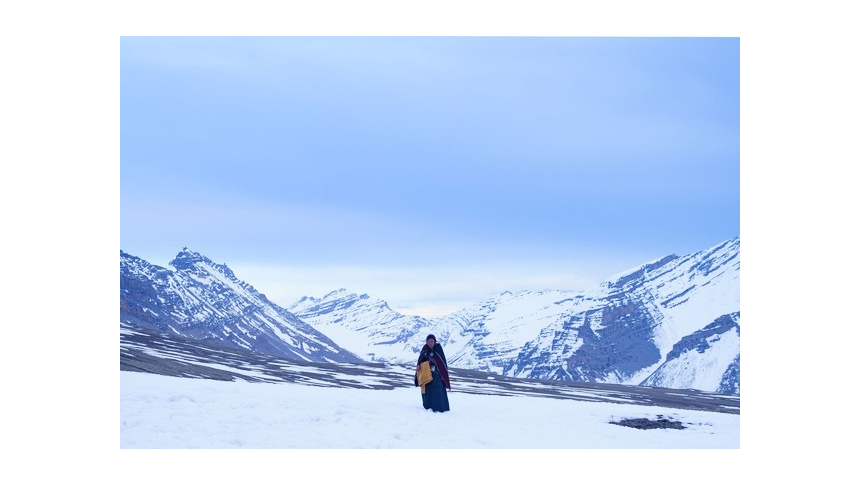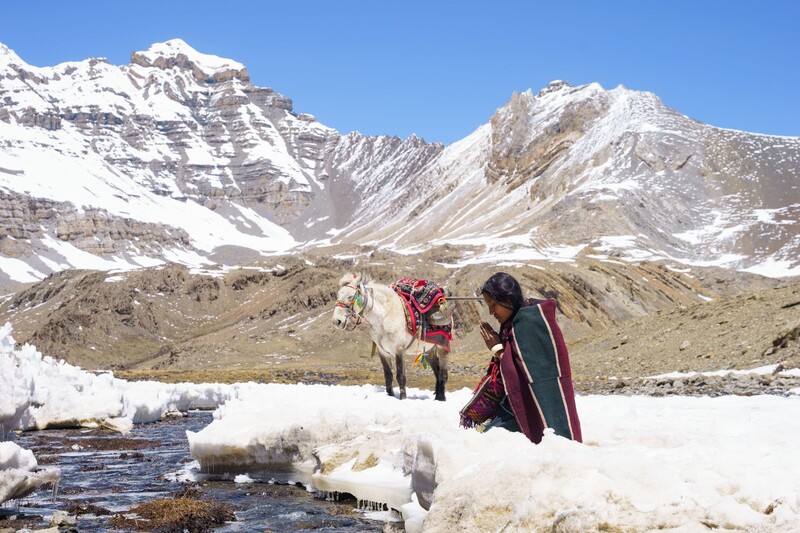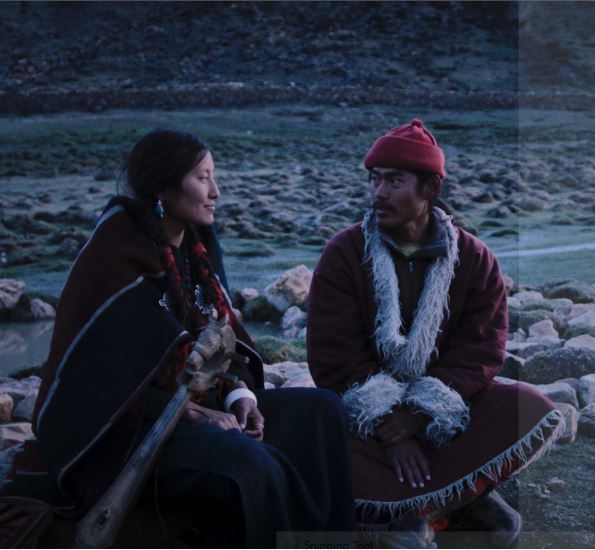Mediterrane 2024 Review: SHAMBHALA, High-Altitude Odyssey with Spiritual, Feminist Bent
Min Bahadur Bham's sophomore feature explores polyandry, tradition, and agency set against the unforgiving landscapes of the Himalayas.

The latest film by Nepalese director Min Bahadur Bham, Shambhala, explores the tension between tradition and modernity within a Himalayan polyandrous village, set against a backdrop of stunning landscapes.
Newly married and pregnant, Pema (Thinley Lhamo) sets out on a dangerous journey with her monk husband, Karma (Sonam Topden), to find her other husband, Tashi (Tenzing Dalha), who has gone missing on the trade route to Lhasa.
Karma and Tashi are not only her husband-brothers but also blood brothers. This journey through the harsh wilderness transforms into a high-altitude odyssey of self-discovery and liberation.
Min Bahadur Bham continues the storytelling trajectory established in his previous film, Black Hen, Nepal's official submission for the Best Foreign Language Film category of the 89th Academy Awards. This pastoral coming-of-age narrative, set against the backdrop of the Nepalese civil war, unfolds around a high-altitude school.
In his sophomore feature, Bham shifts towards a more spiritual focus. The challenges encountered during the production—filming at altitudes between 4,200 and 6,000 metres above sea level—imbue the story with a picturesque quality, highlighting themes of female resilience.
The Flute (2012), Nepal’s first entry to the Venice International Film Festival, and Black Hen (2015), winner of the FEDEORA Best Film Award at Venice Critics Week, showcased Bham's ability to weave intimate stories against the backdrop of Nepal's socio-political landscape. Shambhala continues in this direction, but with an expanded scope and ambition. It digs deeper into the themes of love, marriage, sacrifice, and reincarnation, reflecting contemporary Nepalese society's evolving dynamics.
The core story of Shambhala is as much about the taxing journey through the majestic Himalayas as it is about the internal voyage of its protagonist, Pema. Bham employs long, fixed shots to capture the expansive landscapes, which complement the meditative visual style. This approach, influenced by Buddhist philosophy, is personified by Karma, who struggles to adapt to life outside the monastery, particularly on a mission fraught with adversity to find his brother.
Pema navigates the rigid structures of tradition with both grace and defiance, challenging outdated norms and asserting her agency. Tashi's disappearance is not without reason. He fails to return from his trade journey after Pema becomes the subject of local gossip following a night when Ram Sir (Karma Shakya), the teacher of 11-year-old Dawa (Karma Wangyal Gurung), the third brother she married but whom Pema treats maternally, spends the night at her house.
This incident sparks speculation about the legitimacy of Tashi's fatherhood of Pema's unborn child. Determined to dispel these rumours, Pema embarks on a gruelling journey across the Himalayas to find Tashi and prove that the gossip is unfounded.
Shambhala blends traditional beliefs with contemporary issues, depicting polyandrous relationships with a nuanced perspective that extends the understanding of the heritage of Himalayan communities. Bham utilises various local elements to depict the culture and community, including the use of local dialects, traditional folk instruments, and customs.
During her travails, Pema witnesses an archery challenge for women, a practice that borders on superstition, intended to prove a local woman's innocence of adultery allegations. To exonerate herself, the woman, who has obviously never held a bow in her life, must hit the bull's eye.
Bham employs several framings of the central story. Shambhala begins as a social realist drama with a light tone, depicting Pema's preparations for her wedding and moving in with her three new husbands. Karma's departure for the monastery adds a spiritual dimension, as the director includes scenes from the monastery and dialogues with its head, Rinpoche.
The social drama intensifies with psychological overtones after the incident with Ram Sir. When Pema embarks on her journey to find her runaway husband, the film transitions into a survival drama set against the rugged Himalayan landscape.
Even though Bham does not indulge in dramatic plotting, his approach leans more towards a documentary-style observation of a psychological drama. The director maintains a zen-like calmness, even when Pema appears to be at her last resort, stranded in the remote Himalayas with no rations left. The film's disengaged observation, with an ethnographic flair, follows a female protagonist striving to prove her innocence within a patriarchal system stacked against her, exemplified by the impossible archery challenge.
Shambhala is a meditative experience, nestled within a feminist narrative that explores the interplay of individual agency and societal prejudices in a community bound by rigorous traditions. The film's quiet, reflective tone underscores the strength and determination of its protagonist, Pema, as she navigates the dynamics of her polyandrous marriage and the arduous pilgrimage that doubles as a transcendental experince for the protagonist and audience alike.
The film recently screened at the 2024 Mediterran Film Festival in Malta.
Shambhala
Director(s)
- Min Bahadur Bham
Writer(s)
- Min Bahadur Bham
- Abinash Bikram Shah
Cast
- Thinley Lhamo
- Sonam Topden
- Tenzing Dalha









